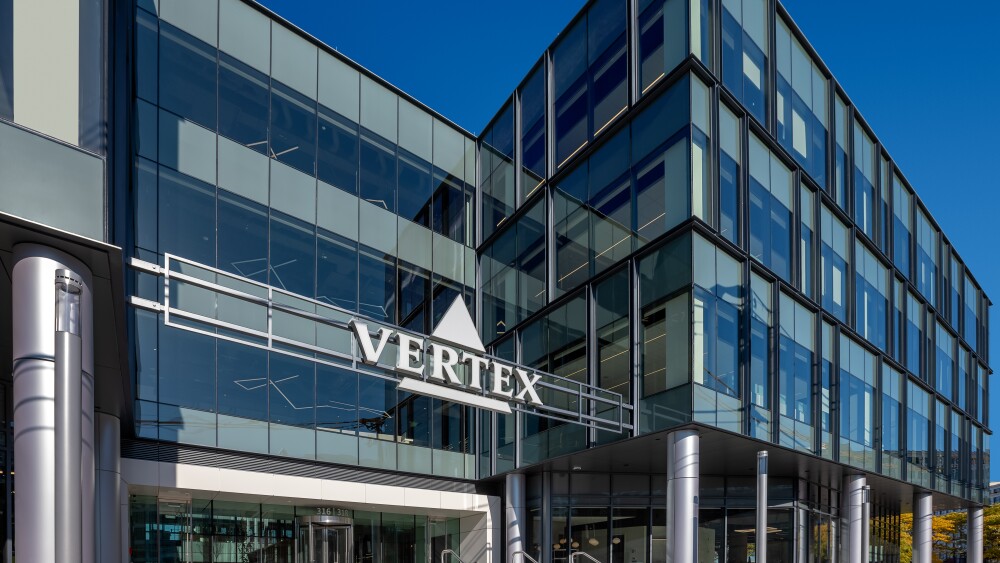Vertex reported healthy revenue in its second quarter earnings report, though news of VX-993’s mid-stage trial results and lack of alignment with the FDA regarding an expanded label for Journavx tempered analyst reactions, sending the stock down 13%.
The next molecule in Vertex Pharmaceuticals’ pipeline of non-opioid painkillers failed its Phase II trial, the company announced Monday, putting a dent in an otherwise positive second quarter report.
Vertex read out topline results for the drug, an investigational NaV1.8 inhibitor called VX-993, from a Phase II trial testing it for acute pain after bunionectomy surgery. VX-993 missed the trial’s primary endpoint, failing to show a statistically significant improvement in the Sum of the Pain Intensity Difference scale after 48 hours post-treatment compared with placebo.
The trial tested the drug in three increasing doses, from low to medium to high. The lowest dose, 10 mg followed by 5 mg every 12 hours, was indistinguishable from placebo, and while two higher doses moved the needle somewhat, they still did not reach statistical significance.
The company is no longer “advancing [VX-993] as a monotherapy in acute pain,” Carmen Bozic, Vertex’s chief medical officer, said in the statement announcing the data.
VX-993 was meant to be a follow-up to Journavx, the company’s NaV1.8 ion channel inhibitor that won a landmark FDA approval in January as the first new mechanism for acute pain approved in the U.S. in more than 20 years. Journavx is intended to treat moderate to severe acute pain in adults.
News of VX-993’s failure came the same day as Vertex’s second-quarter earnings report. On a corresponding call with investors and media, executives said that the FDA appeared not to be inclined to give Journavx a broader approval for peripheral neuropathic pain (PNP).
BMO Capital Markets analysts predicted ahead of the call that Vertex shares could face pressure “with the company simultaneously announcing plans to discontinue the development of VX-993 in acute pain and lack of alignment with FDA on a broad PNP label.”
Shares of Vertex are down 13% to $408.02 in premarket trading on Tuesday.
Vertex’s revenue for the quarter was $2.96 billion, beating the same quarter last year by 12%, or more than $300 million. That beat consensus estimates by 2%, an example of what BMO called the “usual consistency” of Vertex’s commercial platform. That is an improvement over the first quarter, when the company’s earnings missed expectations by 2.3%.
While it was a small part of Vertex’s overall revenue, the newly approved Journavx also beat estimates, garnering $12 million versus a $7 million estimate for the quarter, a 79% overperformance. The company’s ability to get the drug to patients was a consistent talking point on its earnings call.
“We’re extremely proud of 150 million lives covered in the first few months,” Duncan McKechnie, Vertex’s chief commercial officer, said, also noting that two of the three largest pharmacy benefit managers in the U.S. had agreements with the company. “And we’re working with the third.”
The bulk of Vertex’s revenue came from Trikafta and Kaftrio, its combo cystic fibrosis (CF) medicines, which pulled in $2.55 billion for the quarter.
“CF [is] still the bread & butter” for Vertex, Truist Securities analysts wrote to investors Monday night. However, they added, with the “road bump” in the pain franchise, the company has “poor visibility to commercial diversification.”
Meanwhile, continued slow uptake of Casgevy, its CRISPR Therapeutics-partnered gene-edited cell therapy for sickle cell disease and beta thalassemia, does not bode well for Vertex’s investigational cell therapy zimislecel in type 1 diabetes, “despite impressive clinical data to-date,” noted Truist, which cut its projections for Casgevy.
On the other hand, William Blair analysts said they “view the Casgevy commercial update positively.” Vertex noted on the call that nearly 250 patients have been referred to start the Casgevy treatment process while 115 already started cell collection. Second quarter revenue for the therapy was $30.4 million, up 114% from the first quarter.
"[We] believe Vertex has now established the infrastructure to support significant revenue generation in the back half of 2025 and beyond as more cell collections are converted into cell infusions,” William Blair wrote.
When asked about President Donald Trump’s proposed Most Favored Nation drug pricing policy, and his sending Thursday of 17 letters asking companies to acquiesce to the pricing scheme, CEO Reshma Kewalramani said, “Lines of communication are open, but we have not received a letter.”






